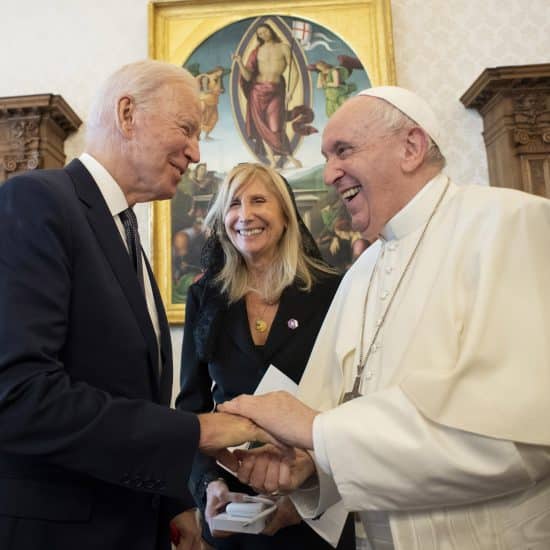
Before Democratic presidential candidate Joe Biden announced his running mate Tuesday (Aug. 11), he first held a chat online with his choice, Senator Kamala Harris. A photo of the conversation shows Harris, who would be the fifth Baptist VP in U.S. history, smiling on a computer screen on Biden’s desk. Just behind the computer is part of a framed “Hägar the Horrible” comic.
“Why me?” Hägar can be seen asking God.
Hidden behind the computer with Harris is the answer in the second part of the comic as a voice from above answers, “Why not?”
Regardless one’s political affiliations or voting preferences this fall, that might be an attitude we need more of in our leaders, whether it be in politics or elsewhere like churches. Too often it seems our leaders are those who step forward and proclaim, “Pick me!”
But many of the greatest leaders in the Bible responded to God’s call with a “why me?” They didn’t seek the glory or the power but instead needed God to say “why not?”

(Austin Chan/Unsplash)
Moses insisted he couldn’t speak well, which has led some scholars to think he had a stutter (like Biden). Even after seeing a bush on fire that didn’t burn up, a staff turn into a snake and back into a staff, and his hand turn leprous and back to normal (and even after his training in the palace), he was still hesitant to accept the role of saving his people from a corrupt ruler.
Gideon felt too insignificant to serve as national leader. His clan’s name didn’t appear in golden letters on any buildings or products. Even after watching as fire flared out of a rock to consume meat and bread and then trying a fleece test in the dew, he was still hesitant enough to request a second fleece and dew test before becoming the commander-in-chief.
Saul felt unworthy to serve as king, hiding not in a basement but among luggage. He didn’t run a big, flashy business when the prophet Samuel anointed him but instead had gotten lost looking for dad’s donkey. Even after that anointing, being met by a procession of prophets, and being so filled with the Spirit that he, too, prophesied, Saul was still hesitant to lead his people.
Jeremiah thought himself too young to deliver an important religious and political message to his people — a problem we don’t have to worry about with our current national candidates! Even after hearing the voice of God (and his upbringing as the son of a priest), Jeremiah was still hesitant to proclaim the needed message to a corrupt and struggling nation.
And then there’s Jesus, God incarnate. He didn’t gather the disciples at the “last supper” and make them go around and talk about how great he is. Instead, he stripped himself down like a slave and washed their feet. This led Paul to urge in Philippians 2:
Do nothing from selfish ambition or conceit, but in humility regard others as better than yourselves. Let each of you look not to your own interests, but to the interests of others. Let the same mind be in you that was in Christ Jesus,
who, though he was in the form of God,
did not regard equality with God
as something to be exploited,
but emptied himself,
taking the form of a slave,
being born in human likeness.
And being found in human form,
he humbled himself
and became obedient to the point of death —
even death on a cross.
It’s an attitude that’s the antithesis of our politics today. It’s an attitude that stands in opposition to really just about any aspect of American culture, including too often our churches and denominations. But it’s the Christlike approach to leadership we find modeled and taught in the Bible.
What if instead of rewarding the most brash, most aggressive, most self-assured leaders we instead elevated those who didn’t seek the position? That would, of course, naturally rule out all our political candidates this year. But we could at least take into account which candidates have more humility, self-sacrifice, and even hesitancy when offered power and glory. When we say that “character matters” in choosing leaders (we do still believe that, right?), these types of moral leadership qualities should impact our judgment.
Of course, hesitancy is not always good. Eventually, we need good leaders who answer the “why not?” question with “Here am I, send me.” But wouldn’t it be nice if our leaders had the humility to stop, ask questions, and listen first before marching?
Even if Biden doesn’t model the cartoon on his desk (and I’m offering no endorsement), perhaps that not-always-so-horrible Hägar had the right attitude. Rather than elevating someone who boasts “I alone can fix it,” what if we looked for leaders in the wilderness, the unknown family, the luggage, or the next generation for the qualified person humbly asking, “why me?”






